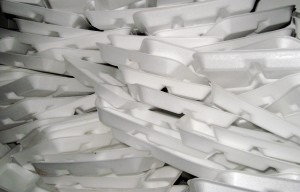
OCEAN CITY — While not advocating for an outright ban on potentially harmful Styrofoam, the resort’s Coastal Resources Legislative Committee this week decided to pursue the issue further before making any recommendation.
Several progressive communities across the country are already banning polystyrene in the form of Styrofoam cups, plates and carry-out boxes, for example. Closest to home, Montgomery County has implemented a phased-in prohibition with the county government’s ban going into effect this week and a private sector ban implemented a year later.
Ocean City late last year began considering following suit, joining communities up and down the east coast along with forward-thinking cities on the west coast including San Francisco, Seattle and Portland, for example. Any potential ban is likely a long way off and it remains uncertain what a finished product might look like, but at the insistence of a private resident, the Mayor and Council instructed the committee, which is referred to as the Green Team, to at least research the issue and come back with a recommendation.
“A resident came to [Mayor Rick] Rick [Meehan] and asked that we look into it and it was decided the Green Team could be a good place to begin that debate,” said Councilman and Green Team liaison Tony DeLuca. “The resident wanted to ban it outright, not just recycle it. We’re bringing it to the Green Team to debate the pros and cons and whether we should pursue it or not.”
The Green Team picked up the debate this week after doing some tentative research, and what they have appeared to discover is Ocean City really doesn’t have a Styrofoam problem. DeLuca said he consulted with Public Works Director Hal Adkins and learned Styrofoam is currently not creating any major issues for the solid waste division.
“The first thing I did was go to Public Works to see if we have a problem,” he said. “What I’ve been told is, we’re not experiencing any problem whatsoever. It’s literally a non-issue.”
DeLuca said drawing from his own food service experience, a mandatory changeover from polystyrene products to something more environmentally friendly could come with great expense to the private sector.
“I’m very familiar with it,” he said. “There could be a tremendous financial burden on the restaurants and hotels that use the products. I guess the question is: is there a reason to do this at this time and at what cost? We could go back and say if it’s not a problem, let’s not pursue it or we could move forward with a ban.”
Greater Ocean City Chamber of Commerce Executive Director Melanie Pursel said at this point the decision should likely be a private-sector one unless the available science dictates otherwise.
“I think that’s kind of a private business decision,” she said. “If a business wants to take on that added expense, then kudos to them, but I’m not sure at this point it should be a mandatory thing.”
Maryland Coastal Bays Program representative Sandi Smith said it is widely believed Styrofoam products are harmful and offered her own anecdotal accounts of collecting the plates, cups and carryout boxes along the beach and Boardwalk, but said there is little science at this point to back it up.
“There is no scientific study of the harm it causes,” she said. “The Green Team’s goal is to educate, but it could be taken a step further. It’s an educational issue at this point, but if the science says this is what it does and here are the problems, we should maybe consider taking it a step further.”
City Environmental Engineer Gail Blazer said banning Styrofoam in Ocean City might be a little premature, but advocated for increased awareness and outreach.
“Maybe an outright ban at this point isn’t needed, but there are steps that can be taken from an education and outreach perspective,” she said. “I think that’s what we need to explore and take something back to the Mayor and Council.”
Blazer said she frequently avoids using too much Styrofoam and said increased awareness might suffice instead of an outright ban. Blazer said if consumers didn’t want it, maybe businesses would find alternatives.
“As a consumer, instead of a box I always ask for a piece of foil if something is small enough,” she said. “That’s the educational component.”
Pursel suggested polling area businesses to find out who is using alternatives and what the cost differences area.
“Maybe we can inventory some of our hotels and restaurants and see how many are already doing this voluntarily and what their costs are,” she said. “We know there are some out there doing this already.”
After considerable debate, the Green Team decided to find out what some communities are doing already and determine the science they used to make their decision and get some feedback from the local business community.

